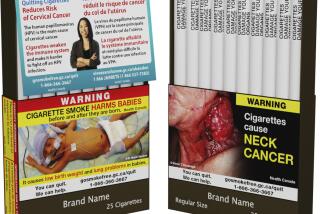Smoking Gets Scarier This Year in Canada
- Share via
A survey of 17,300 eighth-grade students, conducted by the University of Michigan, asked how many had smoked a cigarette on a daily basis--repeat, at least one cigarette a day--during the 30 days prior to the survey.
Eight percent of the eighth-graders said, yes, they had.
Do the math. That’s more than 1,300 kids--some no older than 12--who claim they light up a cigarette every day.
OK, let’s say a few of the 8% lied. You know, just trying to be funny, or else just trying to act cool.
It’s still a scary number.
Now here come a couple of scarier numbers: 15.9% of 10th-graders surveyed and 23.1% of 12th-graders said that they, too, smoked cigarettes daily.
And both of these percentages were up from the previous year.
There go the lungs of the young.
*
Altogether, 14.9% of boys and girls ages 12 to 17 acknowledged that they didn’t simply try a cigarette during the previous 30 days, but had smoked anywhere from a single cigarette to a couple of packs per day.
So much for printed warnings.
So much for loud lectures.
Cancer’s going to continue as a popular trend in the 21st century. Coffin nails for everybody; get ‘em while they’re hot.
You can talk until you’re blue in the face. You can give youngsters all the facts and figures, tell them the ways to survive long enough to become oldsters.
How within 20 minutes of quitting smoking, your blood pressure drops to where it was before your last cigarette. How within eight hours, the level of carbon monoxide in your blood returns to normal. How within two weeks, your respiratory capability increases by as much as 30%.
Or would you just be wasting your breath?
Because nearly 40% of all those surveyed between the ages of 18 and 25 still claim to be everyday smokers.
This percentage did decrease from the 47.4% who said yes back in 1985, but you’d have hoped that it would be down by half or more.
The 1985 survey was taken a year after the U.S. government began using more strongly worded language on cigarette packs, warning smokers of the risks. It has been 35 years since warnings from the surgeon general began appearing, but the original 1966 caveat wasn’t nearly as blunt as the one in 1984.
Do warnings work?
Look at it this way: Despite reduced numbers of smokers, despite legal setbacks costing it billions, Philip Morris Co., the largest U.S. producer of tobacco, is still the ninth-largest corporation in America. So business isn’t exactly suffering.
(Even if suffering is its business.)
It could be that nobody even bothers to notice printed warnings anymore--on a pack, in a magazine ad, on a billboard, anywhere.
Canada, though, is determined to find out.
If you think you’ve seen admonitions that cigarettes can cause pulmonary disease, birth defects, etc., they’re trite compared to what Canadians will be reading on every freshly shipped pack of tobacco imported in 2001 from the U.S.
Beginning this week, there will be 16 different labels on cigarettes stocked on Canada’s shelves. Each label must cover at least half the pack. Each will be written in English on one side, French on the other.
And every warning will come with a picture.
One will show a smoker’s baby, wired to a hospital monitor.
Another will be a close-up of bleeding gums.
A third will depict a couple of children, plus the words: “Don’t Poison Us.”
There are labels with extremely graphic images of diseased hearts and lungs. And if none of these other scare tactics catches a young male’s attention, there’s even one picturing a bent cigarette butt, alongside the message: “Tobacco Use Can Make You Impotent.”
*
According to a story in the Baltimore Sun, merchants in Canada may still sell packs already on their shelves, but newly stocked brands must include one of these 16 lurid, government-sanctioned labels.
President-elect Bush should consider following Canada’s example. He should pass it along to his new Department of Health and Human Services secretary, with copies to the FDA and surgeon general’s offices.
“Read my lips,” Bush could tell the American public on Inauguration Day. “No new smokers.”
He stressed during the campaign that kids come first. Here would be a good way to begin proving it.
*
Mike Downey’s column appears Sundays, Wednesdays and Fridays. Write to: Los Angeles Times, 202 W. 1st St., Los Angeles, CA 90012. E-mail: mike.downey@latimes.com
More to Read
Sign up for Essential California
The most important California stories and recommendations in your inbox every morning.
You may occasionally receive promotional content from the Los Angeles Times.












